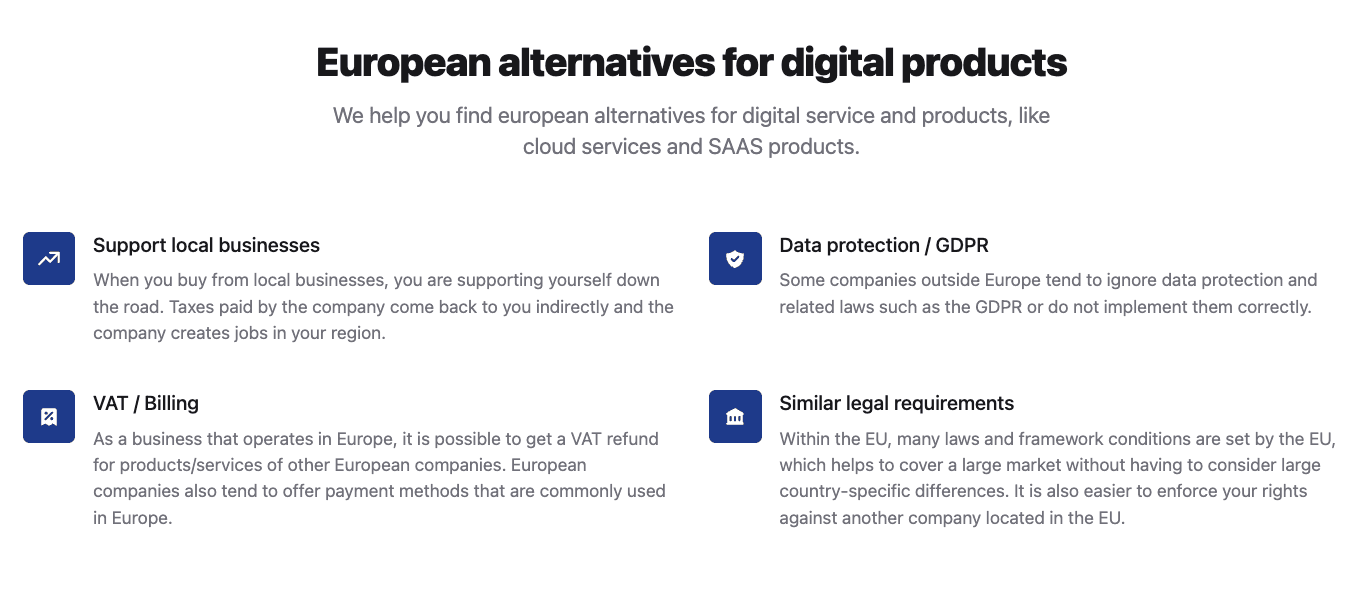Constantin Graf, founder of the European Alternatives platform, comes from Vienna and is a freelance web developer. As a side project, he launched the European Alternatives platform in 2021 to end the tedious search for European alternatives in the digital sector. In this interview, Constantin gives us an insight into the creation and development of his platform.
What is the purpose of European Alternatives?
Graf: European Alternatives collects European alternatives to digital services, cloud and SaaS products. These are clearly arranged in categories. There are categories for server hosting, email providers, web analytics, corporate chats and much more. For each European alternative, there is a short description, information on the country it comes from and additional labels such as "open source" or "sustainable". The products within a category are ranked according to how good we think the European alternative is.
What prompted you to found the European Alternatives platform?

Graf: Since the NSA affair, before I used a new tool privately, I always looked to see if there was something comparable from Europe. After the GDPR and the problem with the transfer agreement became bigger, I also looked where I could professionally to see whether it made sense to use a European tool for new projects. I noticed how tedious this research is. Lists of alternatives were often not available or only in comments on Reddit. And even once you have found a product, it is often difficult to quickly find out where the company behind it actually comes from. Often this information can only be found somewhere small in the middle of the terms and conditions. At some point I thought to myself that it must be the same for several people and started European Alternatives.
How is the platform now financed? Is it true that you started the project on a voluntary basis?
Graf: Yes, that's true. Until recently, I cross-financed European Alternatives with my freelance work. For almost a month now, we have had a sponsor who supports the platform financially. I plan to go more in that direction in the future. In addition, some of the companies listed offer affiliate marketing, which allows us to earn a little money when someone clicks on a link and buys something. However, the products with affiliate links are not given preferential treatment. For example, this does not change the position in the category.
In your opinion, what are the strengths and weaknesses of European tools compared to US tools?
Graf: European tools sometimes have to invest a lot of time and money in order to implement the stricter European laws. One example of this is data protection. This usually benefits customers because the stricter laws are often in their favor.
US-American tools often have considerably more venture capital to expand. This allows them to grow very quickly and offer many features. I think European companies therefore focus more on one thing than developing all-in-one products.
Features, UX, pricing, environmental protection, green hosting and open source are the most important criteria when evaluating European providers!
Constantin GrafFounder of European Alternatives
What are the requirements for admission to the European Alternatives?
Graf: To be listed on European Alternatives, the company's headquarters must be in an EU country or a country that is located in Europe and has a strong relationship with the EU. This currently includes EEA, EFTA and DCFTA countries, as well as open source products that are easy to host yourself.
The rules have been continuously expanded or specified, such as the relatively new open source rule.

What are the 3 most important criteria when evaluating European providers?
Graf: As a first step, I look at all the features a product offers and how well they are actually implemented. This also includes whether value is placed on UX and how professionally the company works in general. It seems to me that web design and UX are often somewhat neglected in European alternatives.
Then I look at the pricing. Is the price justified and which target group does the pricing appeal to?
Thirdly, I look at how the product comes about. Is it powered by renewable energy and what does the company behind it generally do to protect the environment? If it's not a hosting provider, then I look as closely as possible at where the product is hosted. Is the server operated by a European provider, etc.? Some of these criteria have their own labels that make it easier to find products that are open source or hosted green. These things may not seem central at first glance, but the tools that are compared on European Alternatives are usually in use for quite a long time because it does take effort to migrate. Therefore, in my opinion, such issues should also be taken into consideration when making a decision.
What advice would you give to founders who want to establish a new IT solution on the European market?
Graf: I believe that a European company can have a major advantage in the European market if it is marketed well. However, the European "stamp" alone is not enough in the long term. Companies should make sure they are innovative and keep pace with technological developments.
Sproof is already proudly represented on the European Alternatives platform under the category European electronic signature software and in the Alternatives section under European alternatives to DocuSign .
Of course, we at sproof use some European alternatives ourselves, such as Plausible, Scaleway and sendinblue. Tools, which can also be found on Constantin's platform.
More blog entries
Digital signatures according to FDA (Part 11) create traceability in FDA-regulated industries10 criteria for selecting an electronic signature provider"sproof sign convinced us". LeasePlan integrates sproof sign for major project.The combination of electronic signatures and manual signatures on PDF documentsState-of-the-art security and data protection: PMU relies on sproof sign



